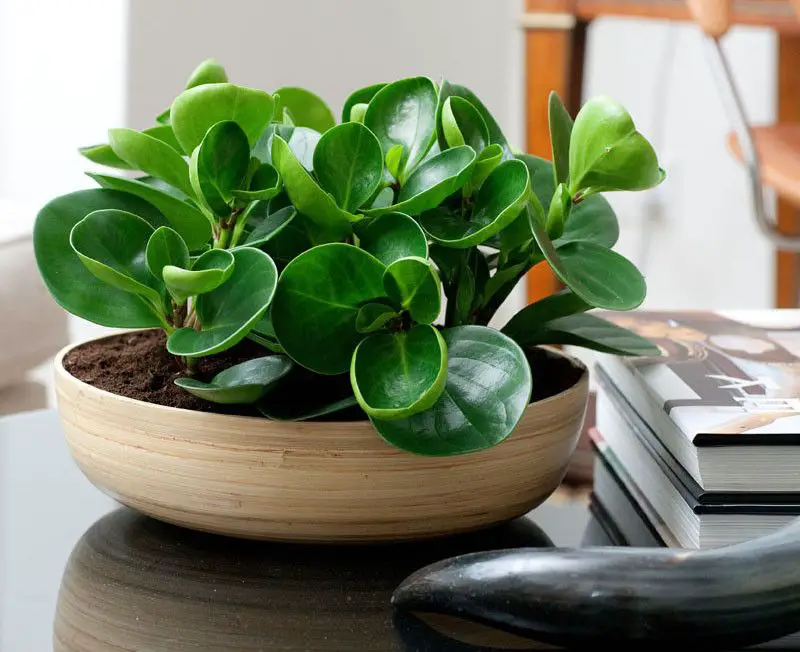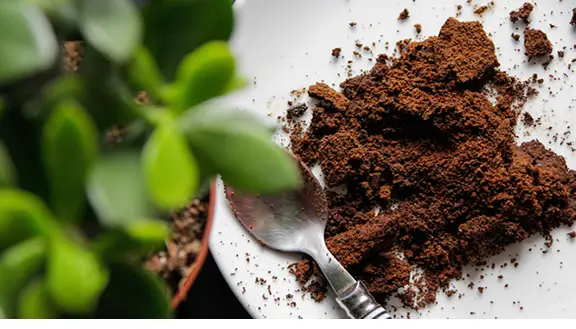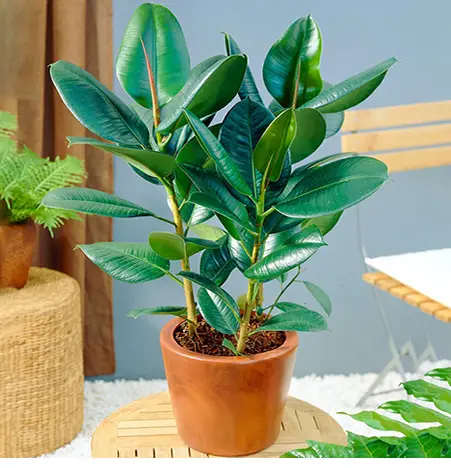The Scary Truth About Using Coffee Grounds On Rubber Plants

Many Americans have a tendency to tip their old coffee grounds into the pot of their home grown rubber plant in the belief that they are giving it a nutrient boost. But do rubber plants like coffee grounds and are coffee grounds good or bad for rubber plants?
Table of Contents
Do rubber plants like coffee grounds? The scary truth!
Ficus elastica, better known as the rubber plant, is a species of fig. Although the rubber plant originated in the southern and south-eastern parts of Asia its introduction to America lead to its naturalization in the state of Florida.
Although it now grows freely in the sunshine state it is popular all over the US as a houseplant.
Many Americans will tip cold coffee and used coffee grounds into the pot of their houseplants, using coffee as a makeshift fertilizer. Contrary to popular opinion this is not a good idea.
 Rubber plants like coffee but here’s why it’s not good for them:
Rubber plants like coffee but here’s why it’s not good for them:
Although coffee grounds can have an instant positive effect on rubber plants, as beneficial microorganisms in the soil use it to produce nitrogen, too much of it will actually kill those same microbes.
Coffee grounds can also lead to fungal growth and stunt the growth of the plant.
Instead of using coffee grounds you should feed a rubber plant with an appropriate fertilizer.
It isn’t just fiscus rubber plants that are at risk from the negative effects of using coffee grounds as a fertilizer, coffee grounds are not good for houseplants in general!
I have covered both the advantages and disadvantages of using coffee grounds as a fertilizer for both houseplants and outdoor plants previously on this site.
In the articles are coffee grounds good for bird of paradise and are coffee grounds good for elephant ears I strongly urge people not to use coffee grounds on those plants.
In fact, it is my view that you should avoid using any type of caffeine product, such as tea or coffee, on any type of plant.
This obviously means I believe that you should not use coffee grounds on your rubber plant.
Why are coffee grounds not good for rubber plants when many people swear by them?
Before we look at the many reasons for avoiding coffee grounds as a plant fertilizer let’s first look at why so many people think they are good for plants.
Why rubber plants may initially react positively to coffee grounds
There is a ton of evidence that shows why using caffeine as a plant fertilizer is not a good idea.
Yet, there are still people who shout about the positive results they get from using them on their plants (as well as using cold liquid coffee).
Why do people talk about the positive results they see rom using coffee grounds and unused liquid coffee on their plants?
Some plants will react well to coffee grounds if they are growing in poor soil that has not been receiving enough nutrients from a proper fertilization routine.
If you look at the stories being told in many online discussion boards you can see a clear pattern emerging.
Many of the rubber plants that are reacting well to coffee grounds are office plants which are most likely being neglected.
I mean, how many times are office plants fertilized and tended to?
It is my guess (albeit an educated guess) that rubber plants which react well to coffee grounds are doing so because they are seriously deficient in nitrogen.
The coffee grounds, that are added to the soil, will have an almost immediate positive effect on the rubber plant.
The soil microorganisms will start to consume the coffee and produce nitrogen, which is then absorbed by the roots of the plant.
However, if this plant is continually subjected to only coffee as a form of fertilizer it will eventually start to show signs of discomfort and fatigue for reasons I will go into later.
I would suggest that those same plants, which react positively to coffee grounds, would look even healthier, grow taller with deeper hues and last much longer, if they were fed the correct plant food and not given toxic coffee grounds.

Before I outline why coffee grounds are toxic to plants I will quickly cover the main reasons that coffee grounds can help your rubber plant.
Below are some of the most commonly held reasons for using coffee grounds on plants:
- Coffee grounds can act as a source of mulch: This is more beneficial to outdoor plants as mulch is unnecessary for potted houseplants. However, even as a mulch coffee grounds fall short as they tend to compact and harden over time making it difficult for water to penetrate the soil and reach the roots of the plant.
- Coffee grounds feed microorganisms (and worms) in the soil: Obviously feeding worms only applies to outdoor plants. However, microorganisms exist in the soil of both outdoor and indoor plants and they can feed on coffee grounds. Although it is true that these microorganisms can gain some benefit from consuming coffee grounds they can also be poisoned by too much of it.
- Coffee grounds add nitrogen to the soil: Rubber plants (or any plant for that matter) that grows in soil that is lacking in nitrogen will see almost immediate, and profound, benefits from adding coffee grounds to the soil. But this is just a quick-fix solution to a long-term problem. And as you will see, in the long-term those coffee grounds could cause much more problems that they solve.
- Coffee grounds are a natural gnat repellent: Coffee grounds do help to protect plants against certain pests such as gnats.
- Coffee grounds are a pet repellent: Cats and dogs hate coffee. The smell will most likely keep them from chewing on your houseplants and stop your cats from trying to poop in the pot.
So, those benefits seem to be great and would make you believe that adding coffee grounds to your rubber plant is a good idea. But wait … there’s a negative side to adding coffee grounds to your rubber plant as well and, in my opinion, the many negatives well outweigh the few positives.
Coffee – The fiscus killer: why coffee grounds are not good for fiscus trees
As I covered already, there may be some slightly beneficial reasons to add coffee grounds to your rubber plant (Ficus elastica), but using it is not advised.
Below I outline the many negative things that can happen to your plant if you start tossing spent coffee grounds (or any type of coffee) into its pot.
- Coffee grounds only offer nitrogen but not much nutrients to the soil: From a plant food point of view the only thing coffee grounds will really offer your rubber plant is nitrogen. Microorganisms in the soil will feed on the coffee grounds and produce nitrogen. Although nitrogen is a much needed element, allowing microorganisms to produce it from coffee grounds is not such a good idea for the reason given in the next point. Additionally, although there are some nutrients in coffee grounds there isn’t a lot and they are slow to get to the plant.
- Coffee is naturally antibacterial: As human beings we become accustomed to desiring antibacterial agents. We use antibacterial hand soap, dish soap and creams, in order to keep those pesky little critters from causing us bodily harm. But, just like we need beneficial bacteria (like gut microbes, i.e. probiotics) so too do your plants. The very microorganisms that produce nitrogen from feeding on coffee grounds will die when they consume too much of them.
- Coffee grounds can stunt plant growth: This scientific study covers all the important information you need to know and highlights the reasons why coffee stunts the growth of plants.
- Coffee grounds can lead to fungal infections: Certain plant fungi love coffee grounds – just one reason why it is easy to grow mushrooms in them. This is great if you want to cultivate some free Shiitakes but it’s not so great for your rubber plant.
It is much better for the health of your rubber plant if you feed it with the correct type of fertilizer.
Using the correct fertilizer for a rubber plant is better than using coffee grounds
Instead of using coffee grounds you should use a plant fertilizer.
Use one that has been developed specifically for the rubber plant or that has the correct ratios of nitrogen, potassium and phosphorus that this species of plant needs.
A good, high quality, houseplant feed will ensure your rubber plant grows well and produces deep green leaves.
But, a rubber plant will react most positively to a plant food that has a 10-10-10 ratio of potassium, nitrogen and phosphorous like this one.
By using a properly formulated, and proven, plant fertilizer feed you will ensure your rubber plant gets all the same benefits (and more) that coffee grounds offer but without any of the dangers that spent coffee poses to it.
There is no question that giving small amounts of coffee grounds to a rubber plant can result in some positive growth spurts.
This is especially true if it is planted in soil that is deficient in nitrogen, but the obvious problems that coffee grounds can cause in the long-term make skipping their use a no-brainer in my opinion.
There are safer ways to give your plant nitrogen and quicker ways to give it nutrients.
So, no matter what you read online, or what you are told by novice gardeners, you should avoid using any type of coffee product or byproduct on your rubbers plants (and all your other plants too).
Completely avoiding using coffee as a plant fertilizer is the only way you can ensure that you are not giving your plant too much of it. Use a good fertilizer instead instead.
Thanks for reading! I'm Michael — houseplant fanatic and your Pinterest plant guide.
Follow me on Pinterest for fresh updates 🌿



